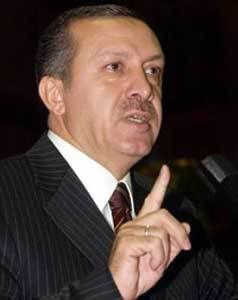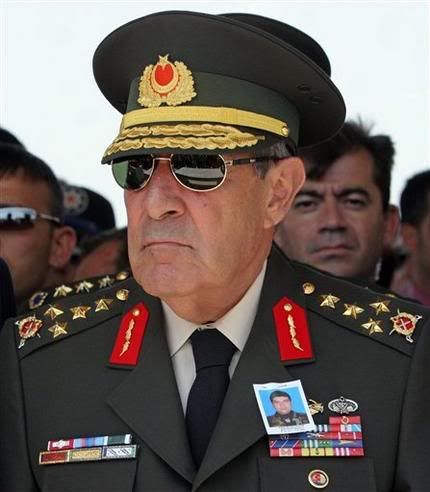NEWS ANALYSIS: Turkish military forces early election
EU worried, U.S. remains confident in Turkish democracy
By Emil Sanamyan


WASHINGTON - Only last week the Justice and Development Party (AKP)-dominated Turkish Parliament was set to elect Foreign Minister Abdullah Gul as the country’s next President. But this week, Prime Minister Recep Tayyib Erdogan of AKP is being forced to call an early general election and risk losing parliamentary majority.
What happened?
While AKP has been in power in Turkey since its 2002 victory in general elections, the party remained largely outside the military-dominated Kemalist establishment, the so-called “White Turks,” that has been in charge of Turkey since the 1920s.The military previously forced four Turkish governments it did not like into early retirement, sometimes jailing or even executing its leaders.
The military has always been suspicious of AKP’s non-Kemalist agenda and Islamist roots. But through a combination of efforts to move forward Turkey’s membership bid in the European Union (EU), political bankruptcy of secular nationalists and restraint exercised by the previous armed forces chief Gen. Hilmi Ozkok, AKP was able to take charge of the government.
Five years later, Turkey has more than recovered from an earlier economic crisis and even achieved some headway in talks with the EU. As part of EU-mandated democratization, AKP has also managed to somewhat limit the military’s influence in domestic affairs.
But Turkey’s courts, secular opposition parties, much of the media and especially the state bureaucracy, including the presidency remained the bastion of nationalists who oppose what they see as AKP’s “Islamization through democratization” agenda.
Since his selection as Turkish military’s chief last year Gen. Yasar Buyukanit said, and repeated this view during his February visit to Washington, that, in his assessment, the “Turkish Republic has never faced as many threats as it faces now.” Stalling talks with EU and the crisis in Iraq only added to the nationalists’ perpetual concerns, but also gave them more freedom for action.
Murder of Hrant Dink and subsequent dead-end investigation sent yet another unmistakable signal to those who may have had doubts of Turkish nationalists’ ability to bite. While Erdogan pointed to the role of “deep state,” Turkish security officials congratulated the murderers.
Showdown
As the term of the military-friendly president Ahmet Necdet Sezer began to run out (it will on May 15), the generals and their allies warned the government not to nominate Mr. Erdogan or another Islamist candidate for the presidency. Well-attended and well-organized demonstrations were held in Ankara and Istanbul to show the public’s concern with “Islamization.”
But with more than ample majority in Parliament, the way appeared open for AKP to nominate one of its leaders for president, which in Turkey is selected by Parliament. Perhaps since Mr. Gul was seen as less irritating to the military and well liked in the West, he was eventually the one nominated.
On April 27, probably sensing AKP was letting itself be pushed back, the Turkish military made an announcement which said, in so many words, that it will do all it can to stop an election of a president it does not like.
The military-allied parliamentary opposition appealed to the Constitutional Court to annul the first round of presidential elections on the grounds that two-thirds of all parliament members did not participate in the vote. Never mind that Turkey’s constitution demands that only one-third be present for any parliamentary session to be legal. The pro-military Court complied.
While the EU warned the military to stay out of politics, U.S. officials remained stoic in face of apparent breaches in due process. During April 30 and May 1 briefings, a State Department spokesperson repeatedly expressed “real confidence in Turkey’s democracy” and “faith in Turkish constitutional process.”
The Washington Post suggested in a May 1 editorial, that the Bush Administration was keeping a low profile “mindful of its low standing among Turks.” But that factor rarely stops U.S. from expressing its views. A more likely reason for lack of U.S. reaction is that Washington officials have been, or think that they have been, better informed of Turkish leaders’ intentions than have Europeans.
Whatever is the case, it is quite likely that many U.S. policy makers may see a secular “correction” in Turkey as beneficial to U.S. interests. Indeed, Turkey’s leaders, both AKP and the military, have been less that helpful to U.S. efforts in Iraq and containment of Iran.
But while the source of AKP’s opposition appears ideological (Islamist solidarity), the military’s concerns are rooted firmly in real politic – and first and foremost making sure an Iraqi Kurdish state can not shift the regional balance of power against Turkey.
Prospects
The Constitutional Court ruling means that any future presidential candidate could be blocked by minority parties. (Unless of course the ruling is ignored as the Constitution was this time around.)
Still exuding confidence about his and his party’s popularity, Mr. Erdogan is now saying he is ready for early elections to be held about forty days from now. But, in return, the military’s allies in parliament are asked to support a proposal to make the presidential post popularly elected, potentially shifting the balance of power within Turkey away from prime minister.
Mr. Erdogan said, "the parliamentary democratic system has been blocked. The only way to get rid of this blockage, and to lift the domination of a [parliamentary] minority over the majority, is to go to the nation... and let the people elect their president with an election system of two rounds."
But parliamentary opposition leader has so far refused to negotiate on terms of early elections. Deniz Baykal, the chairman of the People's Republican Party (CHP), told reporters in Ankara on May 1 that early elections were "a constitutional requirement." Mr. Baykal said, "A parliament that cannot elect a president should hold elections. The only thing that the Turkish parliament can do is to [call for early elections]. A negotiation on that is not possible."
Should negotiations on early elections take place after all, CHP and other secular nationalists that were left outside the Parliament in 2002 are likely to make proposals of their own that would help improve their representation in next Parliament by, for example, lowering the 10 percent threshold for entry. That change, or alternative an electoral alliance of several nationalist parties, might mean that Turkey’s next government may not include AKP at all.

No comments:
Post a Comment